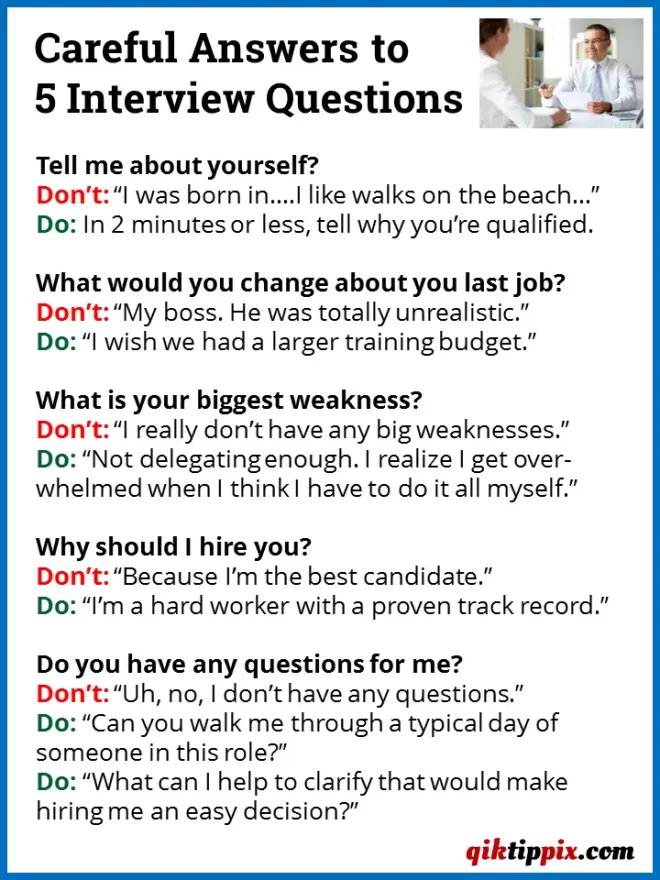You’re about to embark on the exciting journey of job hunting, and as you prepare for interviews, you may find yourself wondering what questions you might encounter. In this article, we’ll explore the most common interview questions that hiring managers often ask, and provide you with valuable tips on how to craft compelling answers. From the classic “Tell me about yourself” to the infamous “What is your greatest weakness?”, we’ve got you covered. So, get ready to ace your next interview with confidence and polish.
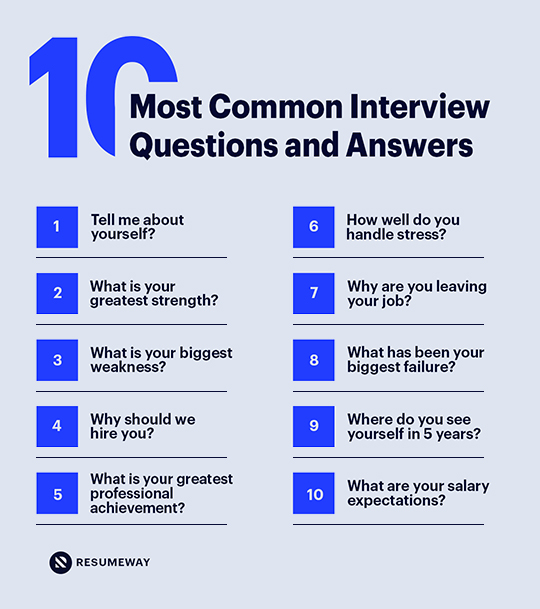
Types of Interview Questions
Interviews can be nerve-wracking, but with the right preparation, you can ace them with confidence. One key aspect of interview preparation is understanding the different types of questions you may encounter. By familiarizing yourself with these question types, you can anticipate what the interviewer is looking for and craft effective responses. In this article, we will explore four common types of interview questions: behavioral questions, technical questions, situational questions, and experience-based questions.
1. Behavioral Questions
Behavioral questions aim to assess your past behavior and how you handle various situations. These questions give the interviewer insights into your skills and abilities. Here are a few examples of common behavioral questions:
– Tell me about yourself.
This question provides you with an opportunity to give an overview of your professional background, skills, and achievements. Keep your response concise and focused on relevant information.
– Describe a time when you faced a challenge at work and how you handled it.
The interviewer wants to know how you approach and overcome difficulties. Choose a specific example and walk them through the situation, your actions, and the positive outcomes.
– Give an example of a time when you demonstrated leadership skills.
Leadership skills are highly valued in many work environments. Share an experience where you took charge, motivated others, and achieved significant results through your leadership.
– Discuss a situation where you had to work as part of a team.
Employers often look for individuals who can collaborate effectively in a team. Talk about a specific project or task where you worked closely with others, highlighting your teamwork skills and outcomes.
Preparing and practicing your responses to these behavioral questions will help you showcase your abilities and make a positive impression on the interviewer.
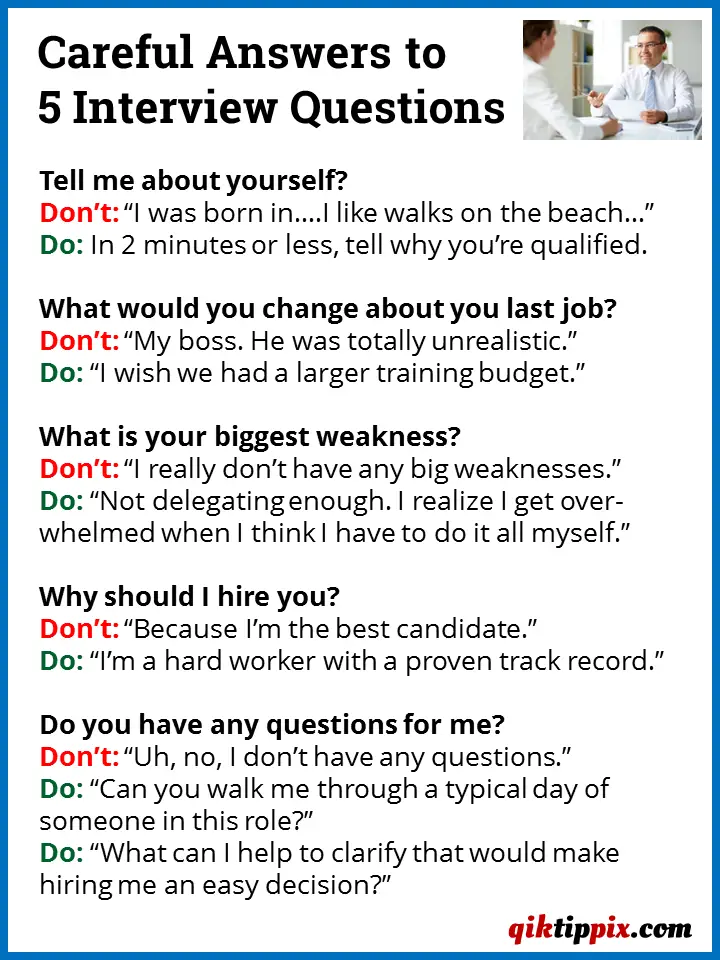
2. Technical Questions
Technical questions assess your knowledge and proficiency in specific technical areas relevant to the job. These questions vary depending on the industry and role you are applying for. Here are a few examples:
– What relevant technical skills do you possess?
This question allows you to highlight your technical expertise. Mention specific skills, tools, or programming languages you are proficient in and provide examples of how you have applied them successfully in the past.
– Explain how you would approach solving a specific technical problem.
The interviewer wants to gauge your problem-solving abilities. Outline a clear and logical approach to the problem, discussing the steps you would take and the considerations you would make along the way.
– Describe a project where you used a specific programming language or tool.
Use this question to demonstrate your hands-on experience with a particular programming language or tool. Explain the project, your role, and how you utilized the language or tool to achieve the desired outcomes.
– How do you stay updated with the latest industry trends and technologies?
Employers value professionals who are continuously learning and adapting to new developments. Share how you keep yourself informed, such as through attending conferences, reading industry publications, or participating in online courses.
By preparing for technical questions, you can showcase your knowledge and expertise, showing the interviewer that you are capable of handling the technical aspects of the job.
3. Situational Questions
Situational questions assess how you would handle specific scenarios that may arise in the workplace. These questions help the employer gauge your problem-solving skills, decision-making abilities, and adaptability. Here are a few examples:
– How would you handle a difficult coworker or team member?
This question aims to evaluate your interpersonal skills and conflict management abilities. Share a strategy you would use to address the situation, emphasizing communication, understanding, and collaboration.
– What would you do if a project deadline was unexpectedly moved up?
The interviewer wants to assess your ability to handle time pressure and adapt to change. Describe how you would reprioritize tasks, communicate with relevant stakeholders, and work efficiently to meet the revised deadline.
– Describe a situation where you had to deal with a dissatisfied customer.
Customer service skills are highly valued in many roles. Talk about a specific instance where you successfully resolved a customer’s issue, highlighting your ability to remain calm, empathize, and find a satisfactory resolution.
– If you disagreed with your manager’s decision, how would you approach it?
This question assesses your ability to handle disagreements professionally and constructively. Explain how you would respectfully express your viewpoint, provide supporting arguments, and be open to finding a compromise.
Being prepared for situational questions allows you to demonstrate your problem-solving skills and showcase your ability to handle challenging situations effectively.
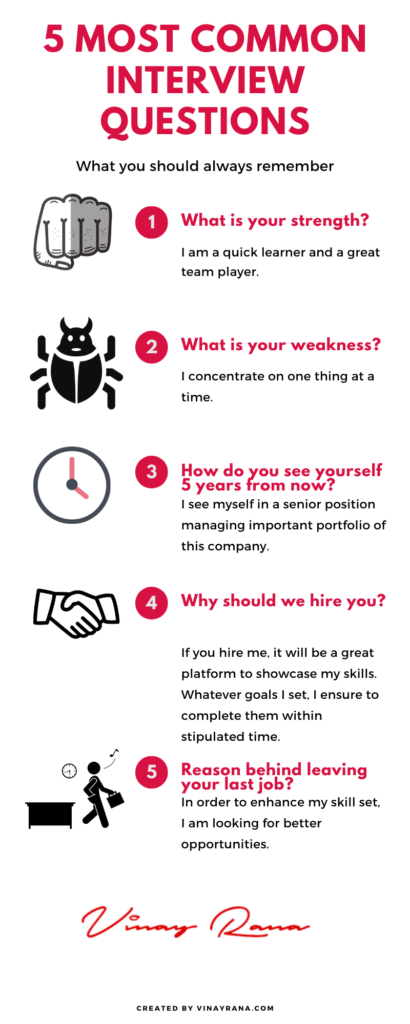
4. Experience-based Questions
Experience-based questions delve into your past job experiences to assess your skills, accomplishments, and work ethic. These questions help the interviewer gain insights into your work history and how you may perform in the new role. Here are a few examples:
– Tell me about a project you completed successfully.
Choose a project that highlights your skills and achievements. Discuss the project’s goals, your specific role, the challenges you faced, and the successful results you achieved.
– What was the most challenging task you faced in your previous role?
This question aims to gauge your ability to handle difficult situations. Describe the task, the obstacles you encountered, and how you overcame them, emphasizing your perseverance and problem-solving skills.
– Describe a time when you made a mistake and how you resolved it.
Admitting to mistakes and demonstrating the ability to learn from them is important. Discuss a specific mistake, explain how you took responsibility, rectified the situation, and implemented measures to prevent similar errors in the future.
– Share an example of a time when you went above and beyond for a customer.
Customer satisfaction is crucial in many industries. Describe an instance where you went the extra mile to ensure a positive customer experience, emphasizing your commitment to providing excellent service.
By reflecting on your past experiences and preparing examples that highlight your skills and achievements, you can respond confidently to experience-based questions.
General Tips for Answering Interview Questions
In addition to understanding the different question types, here are some general tips to help you answer interview questions effectively:
-
Do thorough research about the company and the job position. This will allow you to tailor your answers to align with the organization’s values and requirements.
-
Practice answering common questions beforehand. Rehearse your responses to different question types to become more comfortable and coherent during the actual interview.
-
Prepare specific examples from your past experiences to demonstrate your skills. Having concrete examples ready will make your answers more persuasive and memorable.
-
Follow the STAR method (Situation, Task, Action, Result) when answering behavioral questions. This structure ensures that you provide a clear and organized response, highlighting the positive outcomes of your actions.
-
Stay positive and focus on your strengths. Highlight your accomplishments and valuable attributes instead of dwelling on weaknesses or failures.
-
Listen carefully to the question and ask for clarification if needed. It is better to fully understand the question before providing a relevant and precise response.
-
Maintain good posture and eye contact during the interview. Non-verbal communication plays a significant role in conveying confidence and professionalism.
-
Take a moment to gather your thoughts before answering. Collecting your ideas and formulating a concise response will help you provide a well-structured and coherent answer.
-
Be truthful and avoid exaggerating your abilities. Employers appreciate honesty and integrity, so it is crucial to present yourself accurately.
-
Prepare questions to ask the interviewer to show your interest. Ask about the company culture, potential growth opportunities, or any specific projects or initiatives that pique your curiosity.
By following these tips, you will enhance your interview performance and increase your chances of securing the job.
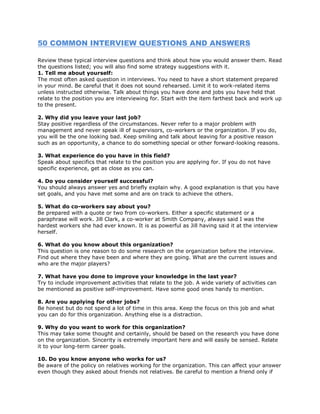
Conclusion
Interviews can be daunting, but with thorough preparation and understanding of the different types of questions, you can confidently tackle any interview scenario. By familiarizing yourself with common interview questions and practicing your responses, you increase your confidence and improve your chances of securing the job. Remember that each interview is unique, so adapt your answers based on the specific job requirements and company culture. Good luck!
